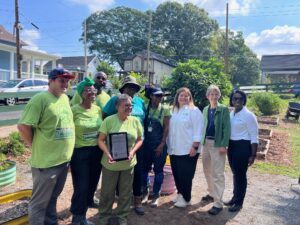On a day that will be remembered as a milestone in the journey toward environmental justice, United States Environmental Protection Agency (EPA) officials visited Atlanta’s Westside to honor a local community leader who has been instrumental in the ongoing cleanup of one of the most toxic sites in the country. The Westside Lead Superfund site, encompassing nearly 2,100 properties west of downtown Atlanta, is at the center of a massive effort to remediate soil contaminated with dangerously high levels of lead.
Rosario Hernandez, a dedicated resident of English Avenue and the founder of Historic Westside Gardens and longtime community partner of Westside Future Fund, was awarded the Citizen Excellence in Community Involvement Award by the EPA. This prestigious national award is presented to only one individual in the country each year, recognizing them for their commitment to working closely with the EPA to tackle hazardous waste issues. Hernandez’s unwavering commitment to the health and well-being of her community made her a standout recipient.
The story of the Westside Lead Superfund site began in 2018, when Emory professor Eri Saikawa and her students discovered alarming levels of lead in the soil of several neighborhoods on Atlanta’s Westside. Lead, a potent neurotoxin, poses severe health risks, particularly to children, and can cause irreversible damage to the brain and nervous system. The contamination likely stems from slag – a toxic byproduct of metal foundries that once dotted the Westside – which was historically used to fill low-lying areas.
Hernandez was among the first residents to have her soil tested, revealing hazardous levels of lead. This discovery was not just a wake-up call for her, but also the beginning of her deep involvement in the cleanup process. Hernandez became a vital link between the EPA and the community, working tirelessly to build trust and encourage residents to allow testing on their properties.
Through perseverance and a commitment to her neighbors, Hernandez helped the EPA test around 1,400 properties and fully remediate 300 of them.
In 2022, the importance of the cleanup efforts was underscored when the Westside Lead site was added to the EPA’s National Priorities List. This designation is reserved for locations that pose serious health threats and require long-term remediation efforts. The project received another boost last year when the EPA announced that the Westside Lead site would benefit from a portion of the $1 billion allocated to Superfund remediation through the Bipartisan Infrastructure Law.
Despite the progress, the cleanup is far from complete. The EPA estimates that it will take until the end of the decade or longer to remove and replace all the contaminated soil across the site. The recognition of Rosario Hernandez’s leadership serves as a powerful reminder that community involvement is crucial in the fight for environmental justice. Her story is one of resilience, advocacy, and hope – a beacon guiding the Westside toward a healthier future.
As Westside Future Fund continues its mission to revitalize and restore the historic Westside, we are inspired by leaders like Rosario Hernandez, who embody the spirit of community and collaboration. The journey may be long, but together, we are making strides toward a safer, healthier, and more vibrant Westside – a community that Dr. King would be proud to call home.

